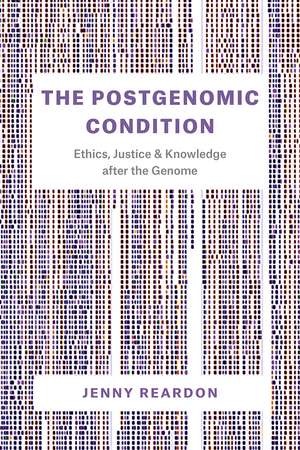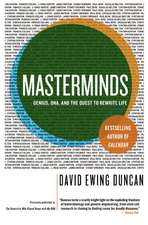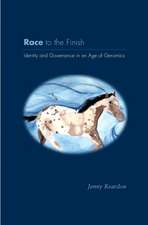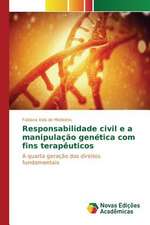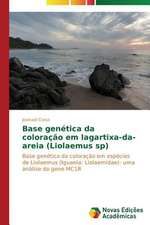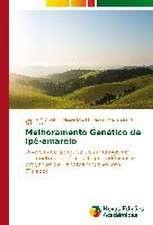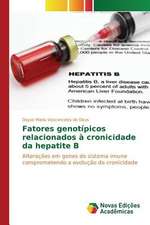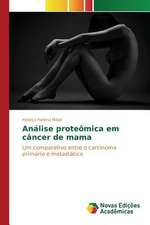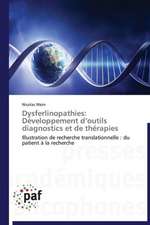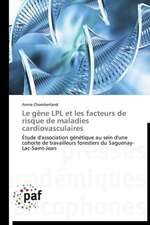The Postgenomic Condition: Ethics, Justice, and Knowledge after the Genome
Autor Jenny Reardonen Limba Engleză Paperback – 29 dec 2017
Now
that
we
have
sequenced
the
human
genome,
what
does
it
mean?
In The
Postgenomic
Condition,
Jenny
Reardon
critically
examines
the
decade
after
the
Human
Genome
Project,
and
the
fundamental
questions
about
meaning,
value
and
justice
this
landmark
achievement
left
in
its
wake.
Drawing on more than a decade of research—in molecular biology labs, commercial startups, governmental agencies, and civic spaces—Reardon demonstrates how the extensive efforts to transform genomics from high tech informatics practiced by a few to meaningful knowledge beneficial to all exposed the limits of long-cherished liberal modes of knowing and governing life. Those in the American South challenged the value of being included in genomics when no hospital served their community. Ethicists and lawyers charged with overseeing Scottish DNA and data questioned how to develop a system of ownership for these resources when their capacity to create things of value—new personalized treatments—remained largely unrealized. Molecular biologists who pioneered genomics asked whether their practices of thinking could survive the deluge of data produced by the growing power of sequencing machines. While the media is filled with grand visions of precision medicine, The Postgenomic Condition shares these actual challenges of the scientists, entrepreneurs, policy makers, bioethicists, lawyers, and patient advocates who sought to leverage liberal democratic practices to render genomic data a new source of meaning and value for interpreting and caring for life. It brings into rich empirical focus the resulting hard on-the-ground questions about how to know and live on a depleted but data-rich, interconnected yet fractured planet, where technoscience garners significant resources, but deeper questions of knowledge and justice urgently demand attention.
Drawing on more than a decade of research—in molecular biology labs, commercial startups, governmental agencies, and civic spaces—Reardon demonstrates how the extensive efforts to transform genomics from high tech informatics practiced by a few to meaningful knowledge beneficial to all exposed the limits of long-cherished liberal modes of knowing and governing life. Those in the American South challenged the value of being included in genomics when no hospital served their community. Ethicists and lawyers charged with overseeing Scottish DNA and data questioned how to develop a system of ownership for these resources when their capacity to create things of value—new personalized treatments—remained largely unrealized. Molecular biologists who pioneered genomics asked whether their practices of thinking could survive the deluge of data produced by the growing power of sequencing machines. While the media is filled with grand visions of precision medicine, The Postgenomic Condition shares these actual challenges of the scientists, entrepreneurs, policy makers, bioethicists, lawyers, and patient advocates who sought to leverage liberal democratic practices to render genomic data a new source of meaning and value for interpreting and caring for life. It brings into rich empirical focus the resulting hard on-the-ground questions about how to know and live on a depleted but data-rich, interconnected yet fractured planet, where technoscience garners significant resources, but deeper questions of knowledge and justice urgently demand attention.
Preț: 283.30 lei
Nou
Puncte Express: 425
Preț estimativ în valută:
54.22€ • 56.01$ • 45.12£
54.22€ • 56.01$ • 45.12£
Carte tipărită la comandă
Livrare economică 25 martie-08 aprilie
Preluare comenzi: 021 569.72.76
Specificații
ISBN-13: 9780226510453
ISBN-10: 022651045X
Pagini: 304
Ilustrații: 19 halftones
Dimensiuni: 152 x 229 x 23 mm
Greutate: 0.4 kg
Ediția:1
Editura: University of Chicago Press
Colecția University of Chicago Press
ISBN-10: 022651045X
Pagini: 304
Ilustrații: 19 halftones
Dimensiuni: 152 x 229 x 23 mm
Greutate: 0.4 kg
Ediția:1
Editura: University of Chicago Press
Colecția University of Chicago Press
Notă biografică
Jenny Reardon is professor of sociology and the founding director of the Science and Justice Research Center at the University of California, Santa Cruz.
Cuprins
Chapter 1 The Postgenomic Condition: An Introduction
Chapter 2 The Information of Life or the Life of Information?
Chapter 3 Inclusion: Can Genomics Be Antiracist?
Chapter 4 Who Represents the Human Genome? What Is the Human Genome?
Chapter 5 Genomics for the People or the Rise of the Machines?
Chapter 6 Genomics for the 98 Percent?
Chapter 7 The Genomic Open 2.0: The Public v. The Public
Chapter 8 Life on Third: Knowledge and Justice after the Genome
Epilogue
Acknowledgments
Notes
Bibliography
Index
Chapter 2 The Information of Life or the Life of Information?
Chapter 3 Inclusion: Can Genomics Be Antiracist?
Chapter 4 Who Represents the Human Genome? What Is the Human Genome?
Chapter 5 Genomics for the People or the Rise of the Machines?
Chapter 6 Genomics for the 98 Percent?
Chapter 7 The Genomic Open 2.0: The Public v. The Public
Chapter 8 Life on Third: Knowledge and Justice after the Genome
Epilogue
Acknowledgments
Notes
Bibliography
Index
Recenzii
“The
Postgenomic
Conditionis
a
beautifully
tendered
plea
for
a
revived
approach
to
ethics
in
genomics
–
one
that
invites
wide
open
discussion
that
includes
the
experiences
and
interests
of
traditionally
marginalized
groups.”
“[T]hought-provoking and intelligently argued. . . Reardon sees genomic medicine as a salvage-attempt to wrest meaning from the various human genome projects undertaken throughout the world. She takes us through the history of DNA sequencing projects as well as through the narratives spun by these genomics communities. . . . Using Hannah Arendt’s notions of active thinking and the ethics of attention, Reardon calls for a re-evaluation of who benefits from genomics. . . . [A] call to arms, beseeching biologists to ‘take back’ biology from informational biotechnology, and to study and appreciate organisms, their interactions, and their messy interpenetrations.”
"Reardon lays out a bold vision for genomics's potential. She probes the value of the human genome from a utilitarian perspective, contending that human DNA and data constitute the raw resource of our times: a commodity whose value is to be quantified as biocapital. Thus, the postgenomic condition is about using information and knowledge as the currency from which to build a 'genomics that is of, for, and by the people'."
"This book is a compelling introduction to the interplay between personal genomics, precision medicine, and social justice. Reardon defines the post-genomic condition as "the question of the uses, significance, and value of the human genome sequence.” In eight highly readable chapters, she critically assesses numerous concerns, including the relatively brief history of global genomics research with an emphasis on programs and initiatives in the US; how race is an issue in genomics research, both socially and scientifically; and whether genomics research benefits the general populace or predominantly supports researchers and the businesses that have developed to create and promote genomics-based technologies. An extensive bibliography and notes sections for each chapter offer options for further study. The text is written conversationally and with anecdotes, and although it can be a bit dense at times, the historical narrative and ethical questions are a fascinating insight into a rapidly evolving, wide-ranging scientific field with significant sociological implications. Recommended."
"Across the book, Reardon insightfully explores a number of cases through which we can follow how human genomic programs are operationalized and negotiated across different stakeholders, mostly in the US and Scotland. . . . The book is excellent when Reardon discusses the moral ambition and democratic ambiguities of contemporary genomics – how novel forms of governance are inscribed into genomics institutional design. Reardon is insightful in describing how big genomic programs are imbued with moral and political aspirations—enrolling people in genomic initiatives, promoting a cosmopolitan ethic of care, making space for community consultation, favouring citizens’ control of genomic data—that often turn out to be of limited value or just illusory. She offers interesting comments on the contemporaneity of postgenomics with the rise of major players in digital capitalism such as Google, Facebook, and Amazon."
"Reardon is especially interested in genomics’ role in augmenting or undermining conditions for justice and democracy. The book reads like an unfolding story with a clear narrative and argumentative agenda. She cogently argues that much of genomics research, while masquerading as a vehicle for liberal democracy and justice by revealing our common humanity, fails to create the conditions needed for a more democratic and just society."
"[A] complex but clearly structured account illuminating the intertwined strands of political commitments and scientific assumptions and goals underlying recent decades of genetic research. . . . Equally valuable as a work of science and technology studies and as a work of applied political philosophy. . . . Reardon's book is a skillful mixing of narrative methods and philosophical argument. . . . She illuminates the normative assumptions and exercises of power, as well as the contingent technological developments, that structured particular projects' hypotheses and later led to the abandonment of hypothesis-driven genomic science. . . . The result, an account of the intertwining intellectual and material conditions informing twentieth-twenty-first-century genomics, may justifiably be considered a profound analysis of both science and our postgenomic sociopolitical condition."
"A thoughtful reckoning of how DNA's relationship with the public, research participants, and biotech industries have been drastically altered since the publication of the first human genome sequence by the Human Genome Project in 2003. . . . Reardon makes a clear argument that without deeply collaborative efforts across those invested in genomic research (scientists, social scientists, communities, and companies), science and technology will continue to have a clear relationship with inequality that is not so easily mitigated. . . . While Reardon's book is appropriate for anyone interested in the history and future of biotechnology, I think her book has the greatest implications for researchers (STEM and social scientists alike) at all stages of their careers. This book is a reminder that collaborative, interdisciplinary, and community based science are our best bets for the future of ethical and just genomic research and the production of knowledge."
"How to think —how to make common meanings, how to live thoughtfully with oneself and others, how to consider things, actual things—in a world of endless genomic information and deluges of data is the key question of this marvelous, world-travelling, story-filled book. My favorite chapter takes the reader along Third Street in San Francisco, from glitzy new precision medicine and pharma buildings to a closed reproductive clinic that served mainly black and brown women. Good intentions, democratic and liberal idioms, and vast investments in digitization, but not in people, braid together to shape the heavily capitalized, sharply unequal postgenomic condition. This is a searching, research-rich, generous book, attentive to the dreams and worries of researchers and investors as well as ordinary people. It is a book that studies unending promises with a historically informed eye, while still holding open the possibility that genomic worlds are not fixed, not finished, but still in formation, still thinkable."
"In an American context, Reardon’s stark reminders of how stratified healthcare in the USA remains as one of the greatest obstacles to justice should be read as a call to arms."
Descriere
Now that we have sequenced the human genome, what does it mean? In The Postgenomic Condition, Jenny Reardon critically examines the decade after the Human Genome Project, and the fundamental questions about meaning, value and justice this landmark achievement left in its wake.
Drawing on more than a decade of research—in molecular biology labs, commercial startups, governmental agencies, and civic spaces—Reardon demonstrates how the extensive efforts to transform genomics from high tech informatics practiced by a few to meaningful knowledge beneficial to all exposed the limits of long-cherished liberal modes of knowing and governing life. Those in the American South challenged the value of being included in genomics when no hospital served their community. Ethicists and lawyers charged with overseeing Scottish DNA and data questioned how to develop a system of ownership for these resources when their capacity to create things of value—new personalized treatments—remained largely unrealized. Molecular biologists who pioneered genomics asked whether their practices of thinking could survive the deluge of data produced by the growing power of sequencing machines. While the media is filled with grand visions of precision medicine, The Postgenomic Condition shares these actual challenges of the scientists, entrepreneurs, policy makers, bioethicists, lawyers, and patient advocates who sought to leverage liberal democratic practices to render genomic data a new source of meaning and value for interpreting and caring for life. It brings into rich empirical focus the resulting hard on-the-ground questions about how to know and live on a depleted but data-rich, interconnected yet fractured planet, where technoscience garners significant resources, but deeper questions of knowledge and justice urgently demand attention.
Drawing on more than a decade of research—in molecular biology labs, commercial startups, governmental agencies, and civic spaces—Reardon demonstrates how the extensive efforts to transform genomics from high tech informatics practiced by a few to meaningful knowledge beneficial to all exposed the limits of long-cherished liberal modes of knowing and governing life. Those in the American South challenged the value of being included in genomics when no hospital served their community. Ethicists and lawyers charged with overseeing Scottish DNA and data questioned how to develop a system of ownership for these resources when their capacity to create things of value—new personalized treatments—remained largely unrealized. Molecular biologists who pioneered genomics asked whether their practices of thinking could survive the deluge of data produced by the growing power of sequencing machines. While the media is filled with grand visions of precision medicine, The Postgenomic Condition shares these actual challenges of the scientists, entrepreneurs, policy makers, bioethicists, lawyers, and patient advocates who sought to leverage liberal democratic practices to render genomic data a new source of meaning and value for interpreting and caring for life. It brings into rich empirical focus the resulting hard on-the-ground questions about how to know and live on a depleted but data-rich, interconnected yet fractured planet, where technoscience garners significant resources, but deeper questions of knowledge and justice urgently demand attention.
